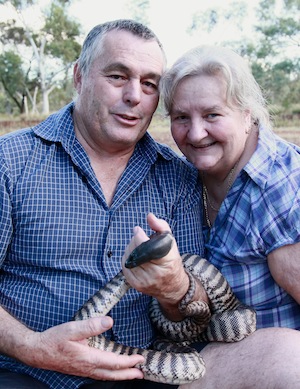Published on Friday, 1 March 2013 at 12:00AM
It’s a dangerous job but someone’s got to do it.

 Local snake catchers Jim and Dot have volunteered for over ten years catching snakes around Tom Price.
Local snake catchers Jim and Dot have volunteered for over ten years catching snakes around Tom Price.
When the call came for a permanent worker, Jim was more than happy to be the man for the job. After training up and getting his DEC licence, he was soon joined by Dot, and together they became the area’s ‘go-to’ snake removal team, catching snakes in homes, schools, hospitals, clubs, mines and even at the swimming pool.
Not only is it risky business – they have been bitten several times - it’s busy business too. They regularly field ten to twelve calls a week, and once caught 200 snakes in one year alone. On top of that, it is also rather costly. Snakes must be released out of town, and some, such as the Olive Python, need to be released near a water hole, sometimes as far as 90km away.
So why do it?
While they are fascinating creatures that help eliminate vermin, there may be a simpler reason: “For the love of the snakes,” Dot says.
In a country with the deadliest snakes in the world, Dot and Jim play a vital educational role in the community to help people better understand snakes and how they can avoid coming to harm. They say the three most common to look out for in the Pilbara are the Whip (mildly venomous) and the deadly venomous Mulga (King Brown) and Gwardar (Western Brown).
Luckily nature plays a role in helping identify dangerous snakes. Dot and Jim say that large, coarse scales usually mean it is poisonous, while small fine scales usually mean it isn’t.
Either way, the best thing to do when a snake is around is to not move. “They won’t react if you stand still. If you’re far enough away, back away,” says Dot. “Don’t antagonise them, and listen to your animals. Dogs bark differently when there is a snake around.”
Jim urges people to call them after a snake sighting. “If you can, follow at a safe distance and watch it so we can catch it and take it away. Don’t call 24 hours later.” They say this is important as it helps prevent neighbours getting bitten.
But what do you do in the unfortunate event that you do suffer a snake bite? The most important thing is to make sure your body doesn’t pump the venom around your bloodstream. “Sit down, put pressure on it, get some help,” says Jim.
But perhaps the best advice is a preventative one.
“Don’t give them food, water and shelter and you won’t have a problem,” says Dot.
If you wish to handle snakes you must obtain a license from the DEC. Rio Tinto also sponsors a three-day course - ‘Working with Animals’ – which is taught by trainers who fly in from Adelaide.
Jim and Dot have produced an information booklet about common snakes of the Pilbara. If you would like a copy they are available for a gold coin donation.
Contact Jim & Dot on 91891427.
Read the full article in Inside Ashburton
Back to All News